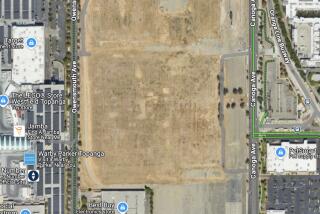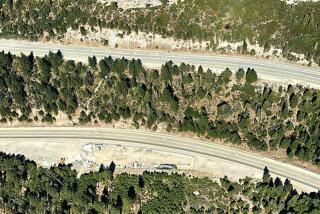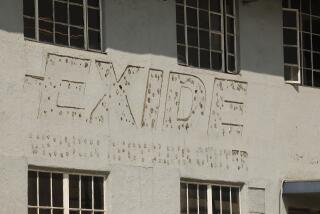Battery recycler in Vernon allowed to reopen — for now
A Vernon battery recycler shut by the state in April as a health risk to thousands of nearby residents will be allowed to reopen pending a court hearing next month, a Los Angeles County Superior Court judge ruled Monday.
Judge Luis A. Lavin said the public interest would not suffer if the plant were to operate in the meantime.
The state Department of Toxic Substances Control ordered Exide Technologies, one of the world’s largest makers and recyclers of lead acid batteries, to suspend operations April 24, saying the facility’s arsenic emissions posed “an unacceptable risk to public health.” The state also said the plant had been continuously leaking hazardous waste into the ground through faulty pipes.
The state’s order followed several Times stories about arsenic emissions from the plant.
The South Coast Air Quality Management District said this spring that arsenic was posing an increased cancer risk to as many as 110,000 people living in the area, including Boyle Heights, Maywood and Huntington Park.
Exide contested the state’s order, contending that the plant had been operating in compliance with regulations, that the toxics department had different standards for Exide than for other companies and that there was “no imminent and substantial danger to the public health, safety or the environment.”
The company said its arsenic emissions have been reduced by more than 70% since 2010.
The suspension order was the subject of a three-day hearing this month before an administrative law judge. But the hearing ended before Exide finished its testimony, and completing the hearing could take months, according to the company’s court filings.
Exide asked the Superior Court to intervene, arguing that the toxics department had relied on “incomplete and obsolete data” and an “illegal ‘underground regulation’” when it shut down the plant.
Exide charged in its filings that the toxics department’s action was “arbitrary and capricious” and said the department had been under “enormous political pressure regarding oversight of facilities” because of criticism from watchdog groups and state legislators.
Meanwhile, the plant’s closure is hurting the company and its workers, according to Exide’s court papers. The Georgia company filed for bankruptcy protection last week, citing the loss of the Vernon plant’s production and other economic factors in its Chapter 11 petition. It listed assets of $1.9 billion and debts of $1.1 billion.
Keeping the plant closed while the company waited for an administrative law judge to schedule additional hearing days would result in “continued unemployment for its workers and millions of dollars of economic damage to Exide,” the company’s lawyers argued.
The judge apparently agreed. “Exide’s administrative remedy is too slow to be effective and/or would result in irreparable harm,” read a hand-written note at the bottom of his order.
Both sides are due back in his courtroom July 2 for another hearing on the matter.
In a statement, a Department of Toxic Substances Control spokeswoman said officials were “disappointed” in the judge’s decision and “look forward to the opportunity to present its case” next month.
Los Angeles City Councilman Jose Huizar, who represents Boyle Heights, said he too was disappointed.
“The criteria for Exide reopening should be based solely on whether it is safe to do so and whether the public is at risk,” he said.
One critic said the department must reckon with its past failure to regulate the plant, enabling Exide to argue that it was acting capriciously and under political pressure when it issued its closure order.
“This is what happens when regulators get in bed with polluters,” said Liza Tucker of Santa Monica-based Consumer Watchdog.
The Times reported in April that the facility has a long history of air pollution and hazardous waste violations, which include allegations that it allowed lead dust to sprinkle down on neighboring rooftops and streets, spilling lead onto Interstate 5 and contaminating groundwater, according to regulators’ reports. Lead is a potent neurotoxin and is considered unsafe for children at even very low levels.
Even so, the state toxics department has allowed the Vernon plant, which melts tens of thousands of batteries a day, to operate on “interim status” since the 1980s. It is the only hazardous waste facility in California that does not yet have a permit required by the landmark 1976 Resource Conservation and Recovery Act — intended to ensure the safe treatment, storage and disposal of hazardous waste.
An Exide spokeswoman did not respond to email and voice messages seeking comment on when the plant would resume operation.
More to Read
Sign up for Essential California
The most important California stories and recommendations in your inbox every morning.
You may occasionally receive promotional content from the Los Angeles Times.











